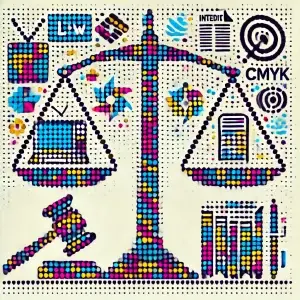Sub-goals „FREE, SAFE & SUSTAINABLE MEDIA“
A guide to a democratic media landscape
Initiative18 pursues clear and concrete sub-goals that together help to promote a diverse, free and sustainable media landscape. Each of these sub-goals represents a key aspect of our mission: protecting and strengthening press freedom, promoting media diversity, using technology responsibly and combating disinformation. Through targeted measures and collaborations, we are committed to a fair, transparent and democratic media future. Discover how we want to realise this vision.

18.1 Ensuring freedom of the press and broadcasting
18.1.1: Implement and enforce laws that protect journalists and media organisations from intimidation, violence and legal persecution.
18.1.2: Prevent censorship through legal measures and international cooperation.

18.2. Preserving media diversity with hybrid business models
18.2.1: Promotion of diversification of revenue sources in advertising financing.
18.2.2: Avoid monopolisation of data and advertising technology by promoting competitive diversity and innovation.
18.2.3: Reducing traffic monopolies by maintaining and strengthening outlinks and promoting decentralised traffic sources.
18.2.4: Promoting political acceptance and support for hybrid, data-driven and advertising-financed business models in the media sector.
18.2.5: Support the establishment of standards for the disclosure of conflicts of interest and sources of funding.

18.3 Responsible allocation of advertising investments
18.3.1: Supplement traditional advertising metrics with sustainable indicators that take into account the social and democratic value of media content as well as grievances on the marketer side, such as disinformation, hate speech or a lack of protection for minors.
18.3.2: Separation of reporting and marketing to ensure independent measurements by third parties and to promote transparency.
18.3.3: No capitalisation of harmful content through advertising.
18.3.4: Recognising the value of journalistic output.

18.4 Fighting disinformation and other harmful content
18.4.1: Holding distribution channels, including global platforms, accountable for the content they distribute.
18.4.2 Promoting technologies and algorithms to recognise and combat disinformation and other harmful content before or immediately after publication.
18.4.3: Promote international cooperation to harmonise regulations and measures against the dissemination of disinformation and other harmful content.
18.4.5: Promoting the special protection of children and young people from harmful content.

18.5 Promoting media literacy and education
18.5.1: Introduction of comprehensive media literacy programmes in schools and educational institutions to promote critical thinking and combat disinformation.
18.5.2: Provide publicly accessible resources and training to improve media literacy for all age groups and social classes.
18.5.3: Train teachers in schools, universities and other educational institutions through hands-on training.

18.6 Integral use of technology and data ethics
18.6.1: Promote responsible use of technology through training and guidelines on data ethics.
18.6.2: Promote transparency in data generation and data quality.
18.6.3: Transparency of algorithms and AI models for balanced presentation of journalistic content and prevention of bias.

18.7 Promoting legal justice in the media and advertising environment
8.7.1: Standardised enforcement of data protection regulations and measures to protect consumer privacy.
18.7.2: Strengthening and enforcing monopoly legislation to ensure fair competition in the media and advertising environment.
18.7.3: Adapt tax law to ensure fair taxation of all market participants and to support free, safe and independent media.

18.8 Recognition of copyrighted journalistic work.
18.8.1: Contemporary copyright protection for journalists and media organisations.
18.8.2: Ensuring fair and transparent remuneration for the use of journalistic content, for example in AI models and other technological applications.
